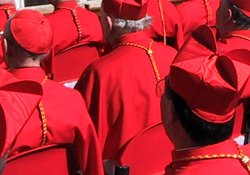 The Pope announced his intention to name 24 new cardinals of the Holy Roman Church today. The public consistory is scheduled for November 20 and it is at this ceremony that the Holy Father's intention becomes official, becoming members of the College of Cardinals. The new cardinals will have their names in inscribed in the list of "Roman priests" who are deputed to elect the Bishop of Rome.
The Pope announced his intention to name 24 new cardinals of the Holy Roman Church today. The public consistory is scheduled for November 20 and it is at this ceremony that the Holy Father's intention becomes official, becoming members of the College of Cardinals. The new cardinals will have their names in inscribed in the list of "Roman priests" who are deputed to elect the Bishop of Rome.
This is the third time the Holy Father has created cardinals since his becoming Pope in 2005. Previous consistories were in 2006 and 2007. The new cardinals reflect the various competences the Church relies upon to preach the Gospel and to serve the Church.
- Italians
Archbishop Angelo Amato, SDB, Prefect of the Congregation of Saints
Archbishop Mauro Piacenza, Prefect of the Congregation of Clergy
Archbishop Fortunato Baldelli, Major Penitentiary
Archbishop Velasio De Paolis, CS, President of the Prefecture of the Economic Affairs of the Holy See
Archbishop Paolo Sardi, Vice-Chamberlain of the Apostolic Chamber and Patron of the Order of Malta
Archbishop Francesco Monterisi, Archpriest of the Basilica of Saint Paul outside the Walls
Archbishop Gianfranco Ravasi, President of the Pontifical Council of Culture
Archbishop Paolo Romeo, Archbishop of Palermo
- North Americans
Archbishop Raymond Leo Burke, Prefect of the Supreme Tribunal of Apostolic Signatura
Archbishop Donald William Wuerl, Archbishop of Washington, DC
- Other Europeans
Archbishop Kurt Koch, President of the Pontifical Council for the Unity of Christians
Archbishop Reinhard Marx, Archbishop of Munich and Freising
Archbishop Kazimierz Nycz, Archbishop of Warsaw
- Africa
Archbishop Robert Sarah (Guinea Conakry), President of Cor Unum
Archbishop Medardo Mazombwe, Emertius Archbishop of Lusaka
Archbishop Laurent Monsengwo Pasinya, Archbishop of Kinshasa
- Asia
Archbishop Malcom Ranjith Patabendige Don, Archbishop of Colombo
- Eastern Church
His Beatitude, Patriarch Antonio Naguib, Patriarch of Alexandria of the Copts
- South America
Archbishop Raymundo Damasceno Assis, Archbishop of Aparecida
Archbishop Raul Eduardo Vela Chiribogo, Emeritus Archbishop of Ecudor
- The Over 80 Cardinals
Msgr. Domenico Bartolucci, Emeritus Master of the Sistine Chapel
Msgr. Walter Brandmüller, Emeritus President of the Pontifical Commission of Historical Sciences
Bishop Elio Sgreccia, Emeritus President of the Pontifical Academy of Life
Archbishop Jose Manuel Estepa Llaurens, Emeritus Ordinary of the Spanish Military
Read journalist John Allen's analysis of the new cardinals: John Allen the new cardinals 2010.pdf

